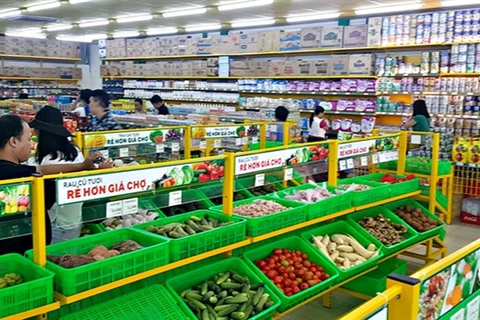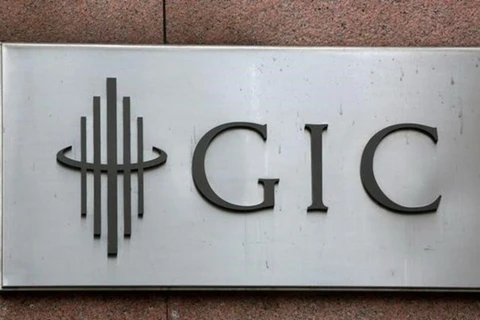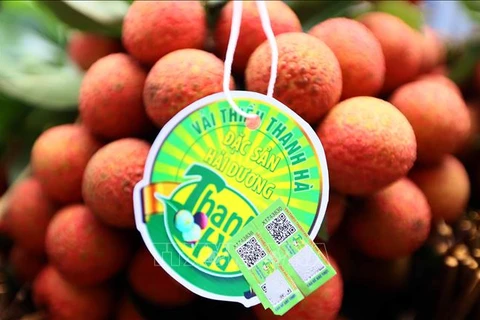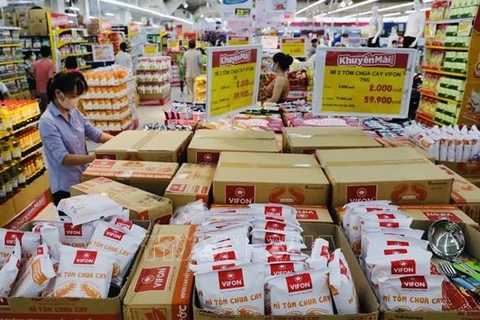Hanoi (VNS/VNA) - Large Vietnamese retailers are trying to expand their scale, exerting competitive pressure on foreign competitors to find opportunities in the retail sector.
Vietnamese billionaire and THACO Group chairman Tran Ba Duong said his firm would expand its Emart supermarket chain so that by 2026, the chain aims to have 20 stores across the country and revenue of 1 billion USD.
This year, it plans to open two hypermarkets in HCM City, one in Thu Duc city’s Thu Thiem area in October and the other in Go Vap district in December.
THACO Group is not alone.
In July, Nova Consumer - a member of NovaGroup - completed the acquisition of Sunrise Foods. That laid a foundation for this firm to expand its distribution channel to 450,000 retail points in the future and promote e-commerce channels and increase exports, baodautu.vn reported.
At the same time, NovaGroup opened its first 2,000sq.m Nova Supermarket in HCM City as part of its plan to expand to more than 2,000 points of sale in the next three years across the country.
Majo George, an expert from RMIT University Vietnam, told baodautu.vn that Vietnamese brands have been expanding their own retail chains or acquiring foreign supermarket systems and then developing them.
This demonstrates the attractiveness of the domestic retail market, which is currently valued at 170 billion USD with a growth forecast of 10% over the next five years, he said.
He said the increase in the number of young middle-class people who are also tech-savvy and discerning shoppers, along with the development of retail chains have paved the way for the development of the retail sector in Vietnam.
According to Vu Thi Hau, Chairwoman of Vietnam Retailers Association, the local retail market has gradually recovered and regained its growth momentum after the pandemic was controlled.
Since the beginning of 2022, many retailers have expanded their supermarkets, distribution systems and new retail models, Hau said, forecasting that Vietnam’s retail industry will continue to prosper in the coming years and is still one of the markets targeted by foreign investors.
To maintain market share, Hau said it is necessary for domestic retailers to continue to improve capacity and prepare for upcoming competition, she said.
Other experts said businesses need to pay attention to local consumer confidence in their products.
Domestic consumers now have more information about products, brands and services, and their needs are increasingly demanding. Therefore, in the long term, small and medium enterprises need to have strategies to enhance the quality of their products and services, and produce according to the market's needs.
Vietnam’s retail sales of goods and services in July reached an estimated 486 trillion VND (20.8 billion USD), up 2.4% month-on-month, and 42.6% year-on-year, according to the General Statistics Office (GSO).
In the first seven months, total retail sales are estimated at 3.2 quadrillion VND, up 16% compared to last year./.
Vietnamese billionaire and THACO Group chairman Tran Ba Duong said his firm would expand its Emart supermarket chain so that by 2026, the chain aims to have 20 stores across the country and revenue of 1 billion USD.
This year, it plans to open two hypermarkets in HCM City, one in Thu Duc city’s Thu Thiem area in October and the other in Go Vap district in December.
THACO Group is not alone.
In July, Nova Consumer - a member of NovaGroup - completed the acquisition of Sunrise Foods. That laid a foundation for this firm to expand its distribution channel to 450,000 retail points in the future and promote e-commerce channels and increase exports, baodautu.vn reported.
At the same time, NovaGroup opened its first 2,000sq.m Nova Supermarket in HCM City as part of its plan to expand to more than 2,000 points of sale in the next three years across the country.
Majo George, an expert from RMIT University Vietnam, told baodautu.vn that Vietnamese brands have been expanding their own retail chains or acquiring foreign supermarket systems and then developing them.
This demonstrates the attractiveness of the domestic retail market, which is currently valued at 170 billion USD with a growth forecast of 10% over the next five years, he said.
He said the increase in the number of young middle-class people who are also tech-savvy and discerning shoppers, along with the development of retail chains have paved the way for the development of the retail sector in Vietnam.
According to Vu Thi Hau, Chairwoman of Vietnam Retailers Association, the local retail market has gradually recovered and regained its growth momentum after the pandemic was controlled.
Since the beginning of 2022, many retailers have expanded their supermarkets, distribution systems and new retail models, Hau said, forecasting that Vietnam’s retail industry will continue to prosper in the coming years and is still one of the markets targeted by foreign investors.
To maintain market share, Hau said it is necessary for domestic retailers to continue to improve capacity and prepare for upcoming competition, she said.
Other experts said businesses need to pay attention to local consumer confidence in their products.
Domestic consumers now have more information about products, brands and services, and their needs are increasingly demanding. Therefore, in the long term, small and medium enterprises need to have strategies to enhance the quality of their products and services, and produce according to the market's needs.
Vietnam’s retail sales of goods and services in July reached an estimated 486 trillion VND (20.8 billion USD), up 2.4% month-on-month, and 42.6% year-on-year, according to the General Statistics Office (GSO).
In the first seven months, total retail sales are estimated at 3.2 quadrillion VND, up 16% compared to last year./.
VNA
























